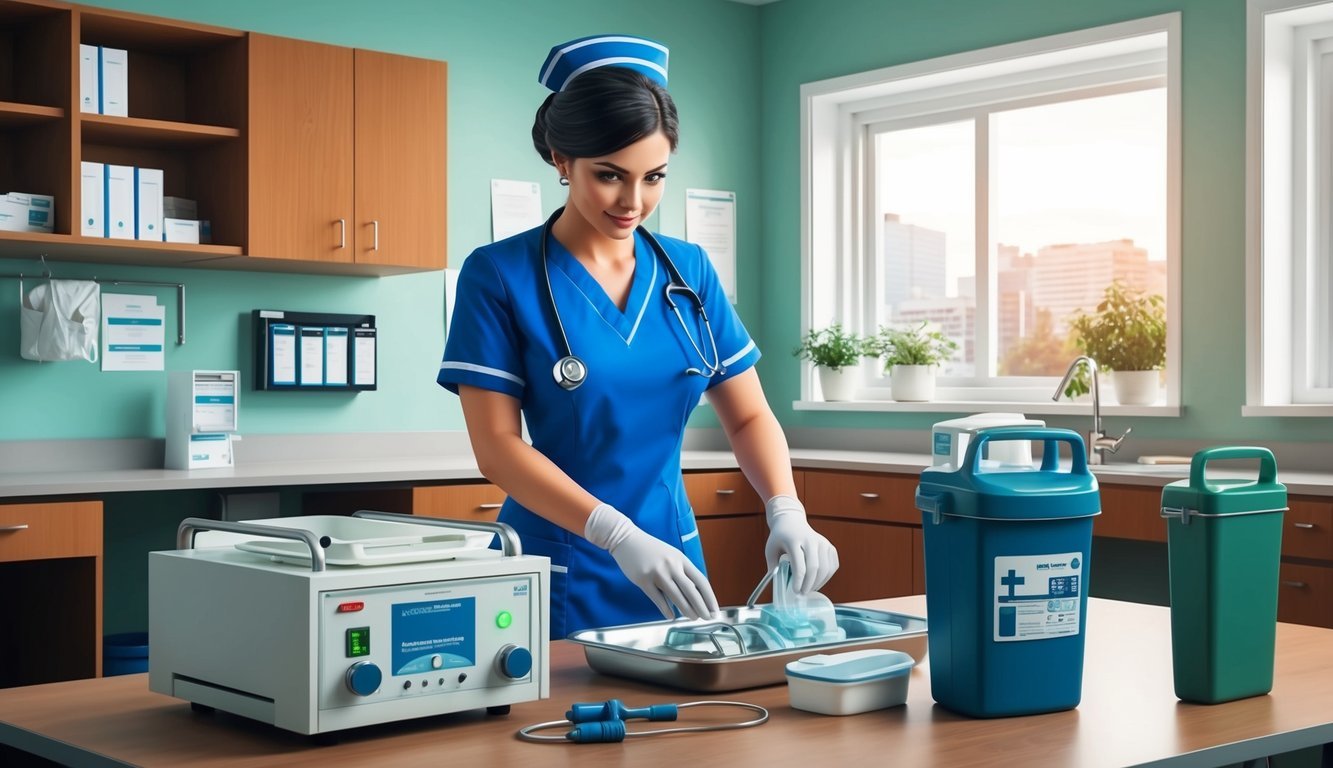As you explore the world of nursing, you may find yourself drawn to the role of a registered nurse (RN). RNs play a crucial role in healthcare by providing essential nursing care, delivering treatment, and supporting patient recovery, making them integral to medical teams.
The path to becoming an RN involves completing educational requirements and obtaining licensure, allowing you to make a significant impact in the lives of patients.
Understanding the responsibilities of RNs can clarify what to expect in this rewarding profession.
Working in various settings, including hospitals and clinics, registered nurses monitor patient health, administer medications, and collaborate closely with physicians.
If you are considering a career in nursing, resources like Nurse.org and Healthline can guide you through the process of getting started and finding the right program for you.
By choosing to pursue a career as a registered nurse, you are stepping into a field that is both challenging and fulfilling.
The demand for skilled nurses continues to grow, offering numerous opportunities for advancement and specialization within your nursing career.
Exploring this path can lead you to a meaningful profession that promotes health and well-being in your community.
Pathways to Becoming a Registered Nurse
Becoming a registered nurse (RN) involves several crucial steps, including completing an accredited nursing program and obtaining licensure.
The pathways available can vary based on the type of nursing degree pursued and the specific requirements in your state.
Nursing Education Overview
To begin your journey as an RN, it’s essential to choose the right educational path.
There are two primary nursing degrees: the Associate Degree in Nursing (ADN) and the Bachelor of Science in Nursing (BSN).
| Degree Type | Duration | Key Focus |
|---|---|---|
| ADN | 2 years | Clinical skills, basic nursing theory |
| BSN | 4 years | Advanced nursing theory, leadership, and management |
Both programs prepare you for the professional skills required in nursing, but a BSN often offers more extensive training and opens up advanced career opportunities.
Key Differences Between ADN and BSN
Understanding the differences between an ADN and a BSN can influence your decision.
An ADN is typically offered at community colleges and focuses on essential nursing skills.
This program is faster and often less expensive.
In contrast, a BSN, available through universities, encompasses broader healthcare topics, including research, public health, and nursing management. BSN program graduates may find increased job opportunities and are often preferred for supervisory roles in healthcare settings.
Licensure and NCLEX-RN Examination
After completing a nursing program, the next step is to obtain licensure.
You must pass the National Council Licensure Examination (NCLEX-RN) to become an RN.
This exam assesses your understanding of nursing concepts and your readiness for practice.
Preparation for the NCLEX-RN often involves review courses and practice tests.
Once you pass, you will be eligible for state licensure, which is necessary to practice as a registered nurse.
Each state has its own licensing board, so ensure you’re familiar with your state’s specific requirements.
Pursuing routes like the RN-to-BSN program can further enhance your qualifications and career prospects.
Navigating a Career in Nursing
Navigating a career in nursing involves understanding your options for specialization, pursuing advanced nursing roles, and committing to ongoing education.
Each of these elements plays a crucial role in shaping your career path and enhancing the quality of care you provide.
Specializing in Nursing Practice
Specialization allows you to focus on a specific area of nursing, thereby enhancing your skills and career prospects.
Common specialties include:
- Pediatrics: Caring for children and adolescents.
- Geriatrics: Focusing on older adults’ healthcare needs.
- Emergency Nursing: Providing acute care in emergency settings.
Choosing a specialty can also impact job growth in your area.
Researching demand in your desired field ensures that your skills align with employment opportunities.
Many nurses find that specializing enriches their career and improves patient outcomes.
For more on nursing specialties, visit Nursing World.
Advanced Nursing Roles
Advanced practice registered nurses (APRNs) play a vital role in modern healthcare.
They can work as:
- Nurse Practitioners (NPs): Offering primary and specialized care.
- Clinical Nurse Specialists (CNSs): Focusing on specific patient populations and improving healthcare delivery.
- Nurse Midwives: Providing care to women during pregnancy and childbirth.
Entering an advanced role typically requires additional education and clinical experience, such as a master’s degree or a doctorate.
The increasing demand for APRNs reflects the growing need for skilled professionals in various healthcare settings.
More insights on advanced roles can be found at ShiftMed.
Nursing Certifications and Continuing Education
Achieving nursing certification can enhance your qualifications and marketability.
Many specialties offer certification exams, such as:
- Certified Pediatric Nurse (CPN)
- Certified Nurse Midwife (CNM)
- Family Nurse Practitioner (FNP)
Continuing education is essential to maintain these certifications and stay current with healthcare trends.
Regularly participating in workshops, conferences, and online courses deepens your knowledge and skills.
You can explore continuing education options through sites like Nursing Education.
The Landscape of Healthcare Employment
The healthcare sector offers a dynamic and evolving work environment for nurses, characterized by diverse roles and significant demand.
Understanding the job outlook and the wide range of nursing positions can provide insight into your career options in this field.
Job Outlook and Demand for Nurses
According to the Bureau of Labor Statistics, the demand for registered nurses is projected to grow by 6% from 2021 to 2031.
This increase is driven by an aging population and an expanded focus on healthcare accessibility.
Key factors influencing job prospects include:
- Increased healthcare needs from chronic conditions.
- The rise of telehealth services.
- Growing emphasis on preventive care.
Specializations such as geriatric care, critical care, and mental health nursing are particularly in demand.
As you explore career paths, consider areas like home healthcare and hospice care, which have seen significant growth recently.
Nursing Roles Across Healthcare Settings
Nurses operate in various settings, each offering unique challenges and opportunities.
Here’s a breakdown of common nursing roles:
| Healthcare Setting | Nursing Roles |
|---|---|
| Hospital | Registered Nurse, Critical Care Nurse, Oncology Nurse |
| Emergency Room | Emergency Nurse |
| Labor and Delivery | Nurse Midwives |
| Ambulatory Care | Licensed Practical Nurses, Wound Care Nurses |
| Home Healthcare | Home Health Nurses |
| Mental Health | Psychiatric Nurse |
| Geriatrics | Geriatric Nurse |
Your choice of setting may influence your specialization.
For instance, working in an operating room requires different skills compared to providing care within an ambulatory care facility.
Each setting offers growth potential, so think about where your passion lies as you navigate your nursing education.
Clinical Skills and Patient Care

Your clinical skills are vital in delivering effective patient care.
Mastery of these skills enhances safety, promotes positive outcomes, and ensures a high standard of nursing practice.
Critical aspects include medication administration, thorough patient assessments, and collaboration across healthcare teams.
Administering Medication and Treatment
Administering medication accurately is crucial in ensuring patient safety.
You must understand dosage calculations, medication interactions, and potential side effects.
Utilize the five rights of medication administration: right patient, right drug, right dose, right route, and right time.
Training during clinical rotations emphasizes the importance of these principles.
Keep detailed records of the patient’s response to treatment and adhere to protocols, especially in critical care settings.
Resources like the U.S. National Library of Medicine can provide further guidance on common medications.
Patient Assessment and Monitoring
Effective patient assessment requires systematic techniques to gather comprehensive data.
You should perform physical examinations and utilize diagnostic tests to monitor patient health.
Skill in identifying abnormalities can help in early intervention, especially in conditions such as diabetes or orthopedic issues.
Regular monitoring of vital signs and patient progress facilitates timely adjustments to care plans.
Use assessment tools like the ABCDE approach (Airway, Breathing, Circulation, Disability, Exposure) in critical situations.
Continuous education and practice will refine your assessment skills, which significantly impacts patient outcomes.
Interdisciplinary Collaboration and Ethics
Collaborating with healthcare workers is vital for holistic patient care.
You work alongside physicians, pharmacists, and specialists to create effective treatment plans.
Strong communication skills enhance teamwork and facilitate better patient management.
Understanding ethical considerations is also key.
Respecting patient autonomy and confidentiality promotes trust in the nurse-patient relationship.
Consider resources on ethical practices in nursing to navigate complex situations effectively.
This ensures high-quality care that is both safe and ethical.

